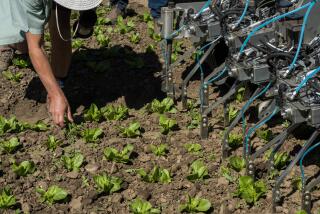Hundreds in Sacramento Protest Bioengineered Food
SACRAMENTO -- Hundreds of protesters knotted this city’s downtown core Sunday on the eve of an international agricultural conference that has become the latest showdown over genetically modified crops and U.S. corporate farming.
Police arrested two dozen demonstrators as scores of officers in full riot gear slowly herded the crowd out of intersections and away from the state Capitol and city convention center, where the conference kicks off this morning.
The three-day Ministerial Conference and Expo on Agricultural Science and Technology has attracted officials from more than 100 countries and some of the biggest firms in international agribusiness.
Sponsored by the U.S. Agriculture Department and other federal agencies, the meeting also has become a focal point for foes of bioengineered crops.
Protesters flooded the streets around the state Capitol, banging drums, chanting slogans and waving signs saying, “Leave Our Genes Alone” and “No Global World Empire.” Demonstrators faced off with police in several tense showdowns that ebbed as the crowd moved on.
But late in the afternoon, squads of police began arresting protesters who wouldn’t move off city streets.
“I’m exercising my constitutional right,” declared Elizabeth Osgood of Chico, as police moved toward her a few blocks east of the convention center. They wrestled her to the ground and handcuffed her with plastic wrist ties. Osgood shouted, “I’m a peaceful person! Let me go!”
Agriculture department officials say the focus of the conference is to reduce hunger and improve nutrition in developing countries through improved technology, not to promote U.S. advances in bioengineering of crops.
The demonstrations don’t reflect “a very good understanding [of] what we’re trying to achieve,” said J.B. Penn, a U.S. Agriculture Department undersecretary. “It’s pretty hard for me to understand why anyone would want to protest against helping stop world hunger.”
U.S. officials say biotechnology can help reduce pesticide use and yield better harvests than conventional crops, helping preserve the environment and improving health. But activists argue that the long-term health risks of genetically altered crops have not been adequately studied, and are part of a growing corporate push into a realm once the domain of family farmers.
“There’s a new wave of genetic conquistadors,” said Patrick Reinsborough, a protest organizer. “They’re trying to commoditize the very building blocks of life.”
Sunday’s demonstration spread beyond the capital core.
At a downtown community garden that is slated for condominiums, 10 demonstrators locked themselves in a circle, shackled hand to hand with iron pipes covering their arms. They vowed to remain until authorities granted their wishes -- to drop the condo plan.
“This is a beautiful place,” said one of the demonstrators, who gave her name as Sage.
Sacramento law officers spent months preparing for the expected protests, vowing to avoid the kind of violence that racked the 1999 World Trade Organization meeting in Seattle. After thousands of windows were smashed and cars vandalized, Seattle police struck back with tear gas and rubber bullets.
Police in Sacramento nearly outnumbered the demonstrators.
Property damage on the downtown blocks fanning out from the Capitol was minimal. Police reported a few broken windows, a half-dozen overturned dumpsters, graffiti-marred cars and a few downed chain-link fences.
A couple of demonstrators climbed traffic light poles and trees, but no serious injuries were reported.
Most of the protesters were loud and nonviolent, eager to spread their belief that bioengineered crops pose a potential risk for the world.
“Genetically altered food is an untested experiment,” said Cal Peternell, 40, a chef at Chez Panisse in Berkeley.
The crowd’s biggest impact was on traffic. Cars in several tied-up intersections were left idling while a sea of demonstrators meandered through. Some motorists simmered over the interruption, but not all.
Corry Cline-Fortunato, 37, of Santa Cruz sat in her white Jaguar and patiently waited it out. “This is what our country is all about,” she said. “Sitting through a couple red lights is a small price to pay for our rights.”
The conference comes as the United States continues pushing the European Union to end its ban on genetically modified food and just months before a September World Trade Organization gathering in Cancun, Mexico, where a showdown between the U.S. and Europe could come to a head.
Times staff writers Eric Bailey and Rhashad Pittman contributed to this report.
More to Read
Sign up for Essential California
The most important California stories and recommendations in your inbox every morning.
You may occasionally receive promotional content from the Los Angeles Times.











